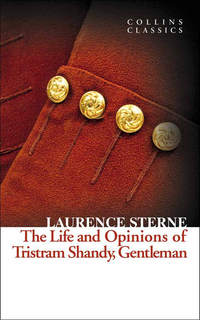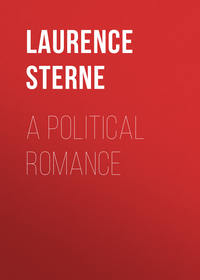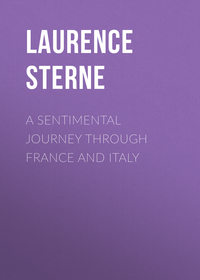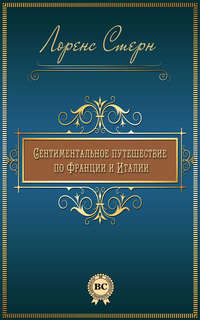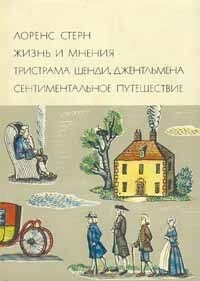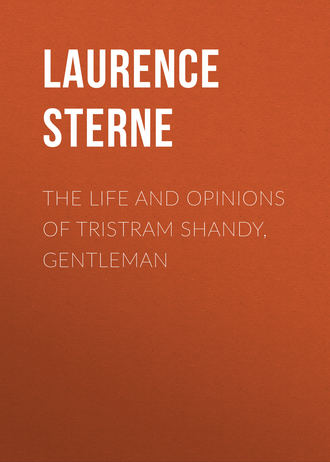
The Life and Opinions of Tristram Shandy, Gentleman
–It would so,—said my mother:—But indeed he is growing a very tall lad,—rejoined my father.
–He is very tall for his age, indeed,—said my mother.—
–I can not (making two syllables of it) imagine, quoth my father, who the deuce he takes after.—
I cannot conceive, for my life, said my mother.—
Humph!—said my father.
(The dialogue ceased for a moment.)
–I am very short myself,—continued my father gravely.
You are very short, Mr. Shandy,—said my mother.
Humph! quoth my father to himself, a second time: in muttering which, he plucked his pillow a little further from my mother's,—and turning about again, there was an end of the debate for three minutes and a half.
–When he gets these breeches made, cried my father in a higher tone, he'll look like a beast in 'em.
He will be very awkward in them at first, replied my mother.
–And 'twill be lucky, if that's the worst on't, added my father.
It will be very lucky, answered my mother.
I suppose, replied my father,—making some pause first,—he'll be exactly like other people's children.—
Exactly, said my mother.—
–Though I shall be sorry for that, added my father: and so the debate stopp'd again.—
–They should be of leather, said my father, turning him about again.—
They will last him, said my mother, the longest.
But he can have no linings to 'em, replied my father.—
He cannot, said my mother.
'Twere better to have them of fustian, quoth my father.
Nothing can be better, quoth my mother.—
–Except dimity,—replied my father:—'Tis best of all,—replied my mother.
–One must not give him his death, however,—interrupted my father.
By no means, said my mother:—and so the dialogue stood still again.
I am resolved, however, quoth my father, breaking silence the fourth time, he shall have no pockets in them.—
–There is no occasion for any, said my mother.—
I mean in his coat and waistcoat,—cried my father.
–I mean so too,—replied my mother.
–Though if he gets a gig or top—Poor souls! it is a crown and a sceptre to them,—they should have where to secure it.—
Order it as you please, Mr. Shandy, replied my mother.—
–But don't you think it right? added my father, pressing the point home to her.
Perfectly, said my mother, if it pleases you, Mr. Shandy.—
–There's for you! cried my father, losing his temper—Pleases me!—You never will distinguish, Mrs. Shandy, nor shall I ever teach you to do it, betwixt a point of pleasure and a point of convenience.—This was on the Sunday night:—and further this chapter sayeth not.
Chapter 3.LXII
After my father had debated the affair of the breeches with my mother,—he consulted Albertus Rubenius upon it; and Albertus Rubenius used my father ten times worse in the consultation (if possible) than even my father had used my mother: For as Rubenius had wrote a quarto express, De re Vestiaria Veterum,—it was Rubenius's business to have given my father some lights.—On the contrary, my father might as well have thought of extracting the seven cardinal virtues out of a long beard,—as of extracting a single word out of Rubenius upon the subject.
Upon every other article of ancient dress, Rubenius was very communicative to my father;—gave him a full satisfactory account of
The Toga, or loose gown.
The Chlamys.
The Ephod.
The Tunica, or Jacket.
The Synthesis.
The Paenula.
The Lacema, with its Cucullus.
The Paludamentum.
The Praetexta.
The Sagum, or soldier's jerkin.
The Trabea: of which, according to Suetonius, there was three kinds.—
—But what are all these to the breeches? said my father.
Rubenius threw him down upon the counter all kinds of shoes which had been in fashion with the Romans.—
There was,The open shoe.The close shoe.The slip shoe.The wooden shoe.The soc.The buskin.And The military shoe with hobnails in it, which Juvenal takesnotice of.There were,The clogs.The pattins.The pantoufles.The brogues.The sandals, with latchets to them.There was,The felt shoe.The linen shoe.The laced shoe.The braided shoe.The calceus incisus.And The calceus rostratus.Rubenius shewed my father how well they all fitted,—in what manner they laced on,—with what points, straps, thongs, latchets, ribbands, jaggs, and ends.—
–But I want to be informed about the breeches, said my father.
Albertus Rubenius informed my father that the Romans manufactured stuffs of various fabrics,—some plain,—some striped,—others diapered throughout the whole contexture of the wool, with silk and gold—That linen did not begin to be in common use till towards the declension of the empire, when the Egyptians coming to settle amongst them, brought it into vogue.
–That persons of quality and fortune distinguished themselves by the fineness and whiteness of their clothes; which colour (next to purple, which was appropriated to the great offices) they most affected, and wore on their birth-days and public rejoicings.—That it appeared from the best historians of those times, that they frequently sent their clothes to the fuller, to be clean'd and whitened:—but that the inferior people, to avoid that expence, generally wore brown clothes, and of a something coarser texture,—till towards the beginning of Augustus's reign, when the slave dressed like his master, and almost every distinction of habiliment was lost, but the Latus Clavus.
And what was the Latus Clavus? said my father.
Rubenius told him, that the point was still litigating amongst the learned:—That Egnatius, Sigonius, Bossius Ticinensis, Bayfius Budaeus, Salmasius, Lipsius, Lazius, Isaac Casaubon, and Joseph Scaliger, all differed from each other,—and he from them: That some took it to be the button,—some the coat itself,—others only the colour of it;—That the great Bayfuis in his Wardrobe of the Ancients, chap. 12—honestly said, he knew not what it was,—whether a tibula,—a stud,—a button,—a loop,—a buckle,—or clasps and keepers.—
–My father lost the horse, but not the saddle—They are hooks and eyes, said my father—and with hooks and eyes he ordered my breeches to be made.
Chapter 3.LXIII
We are now going to enter upon a new scene of events.——Leave we then the breeches in the taylor's hands, with my father standing over him with his cane, reading him as he sat at work a lecture upon the latus clavus, and pointing to the precise part of the waistband, where he was determined to have it sewed on.—
Leave we my mother—(truest of all the Poco-curante's of her sex!)—careless about it, as about every thing else in the world which concerned her;—that is,—indifferent whether it was done this way or that,—provided it was but done at all.—
Leave we Slop likewise to the full profits of all my dishonours.—
Leave we poor Le Fever to recover, and get home from Marseilles as he can.—And last of all,—because the hardest of all—
Let us leave, if possible, myself:—But 'tis impossible,—I must go along with you to the end of the work.
Chapter 3.LXIV
If the reader has not a clear conception of the rood and the half of ground which lay at the bottom of my uncle Toby's kitchen-garden, and which was the scene of so many of his delicious hours,—the fault is not in me,—but in his imagination;—for I am sure I gave him so minute a description, I was almost ashamed of it.
When Fate was looking forwards one afternoon, into the great transactions of future times,—and recollected for what purposes this little plot, by a decree fast bound down in iron, had been destined,—she gave a nod to Nature,—'twas enough—Nature threw half a spade full of her kindliest compost upon it, with just so much clay in it, as to retain the forms of angles and indentings,—and so little of it too, as not to cling to the spade, and render works of so much glory, nasty in foul weather.
My uncle Toby came down, as the reader has been informed, with plans along with him, of almost every fortified town in Italy and Flanders; so let the duke of Marlborough, or the allies, have set down before what town they pleased, my uncle Toby was prepared for them.
His way, which was the simplest one in the world, was this; as soon as ever a town was invested—(but sooner when the design was known) to take the plan of it (let it be what town it would), and enlarge it upon a scale to the exact size of his bowling-green; upon the surface of which, by means of a large role of packthread, and a number of small piquets driven into the ground, at the several angles and redans, he transferred the lines from his paper; then taking the profile of the place, with its works, to determine the depths and slopes of the ditches,—the talus of the glacis, and the precise height of the several banquets, parapets, &c.—he set the corporal to work—and sweetly went it on:—The nature of the soil,—the nature of the work itself,—and above all, the good-nature of my uncle Toby sitting by from morning to night, and chatting kindly with the corporal upon past-done deeds,—left Labour little else but the ceremony of the name.
When the place was finished in this manner, and put into a proper posture of defence,—it was invested,—and my uncle Toby and the corporal began to run their first parallel.—I beg I may not be interrupted in my story, by being told, That the first parallel should be at least three hundred toises distant from the main body of the place,—and that I have not left a single inch for it;—for my uncle Toby took the liberty of incroaching upon his kitchen-garden, for the sake of enlarging his works on the bowling-green, and for that reason generally ran his first and second parallels betwixt two rows of his cabbages and his cauliflowers; the conveniences and inconveniences of which will be considered at large in the history of my uncle Toby's and the corporal's campaigns, of which, this I'm now writing is but a sketch, and will be finished, if I conjecture right, in three pages (but there is no guessing)—The campaigns themselves will take up as many books; and therefore I apprehend it would be hanging too great a weight of one kind of matter in so flimsy a performance as this, to rhapsodize them, as I once intended, into the body of the work—surely they had better be printed apart,—we'll consider the affair—so take the following sketch of them in the mean time.
Chapter 3.LXV
When the town, with its works, was finished, my uncle Toby and the corporal began to run their first parallel—not at random, or any how—but from the same points and distances the allies had begun to run theirs; and regulating their approaches and attacks, by the accounts my uncle Toby received from the daily papers,—they went on, during the whole siege, step by step with the allies.
When the duke of Marlborough made a lodgment,—my uncle Toby made a lodgment too.—And when the face of a bastion was battered down, or a defence ruined,—the corporal took his mattock and did as much,—and so on;—gaining ground, and making themselves masters of the works one after another, till the town fell into their hands.
To one who took pleasure in the happy state of others,—there could not have been a greater sight in world, than on a post morning, in which a practicable breach had been made by the duke of Marlborough, in the main body of the place,—to have stood behind the horn-beam hedge, and observed the spirit with which my uncle Toby, with Trim behind him, sallied forth;—the one with the Gazette in his hand,—the other with a spade on his shoulder to execute the contents.—What an honest triumph in my uncle Toby's looks as he marched up to the ramparts! What intense pleasure swimming in his eye as he stood over the corporal, reading the paragraph ten times over to him, as he was at work, lest, peradventure, he should make the breach an inch too wide,—or leave it an inch too narrow.—But when the chamade was beat, and the corporal helped my uncle up it, and followed with the colours in his hand, to fix them upon the ramparts—Heaven! Earth! Sea!—but what avails apostrophes?—with all your elements, wet or dry, ye never compounded so intoxicating a draught.
In this track of happiness for many years, without one interruption to it, except now and then when the wind continued to blow due west for a week or ten days together, which detained the Flanders mail, and kept them so long in torture,—but still 'twas the torture of the happy—In this track, I say, did my uncle Toby and Trim move for many years, every year of which, and sometimes every month, from the invention of either the one or the other of them, adding some new conceit or quirk of improvement to their operations, which always opened fresh springs of delight in carrying them on.
The first year's campaign was carried on from beginning to end, in the plain and simple method I've related.
In the second year, in which my uncle Toby took Liege and Ruremond, he thought he might afford the expence of four handsome draw-bridges; of two of which I have given an exact description in the former part of my work.
At the latter end of the same year he added a couple of gates with port-cullises:—These last were converted afterwards into orgues, as the better thing; and during the winter of the same year, my uncle Toby, instead of a new suit of clothes, which he always had at Christmas, treated himself with a handsome sentry-box, to stand at the corner of the bowling-green, betwixt which point and the foot of the glacis, there was left a little kind of an esplanade for him and the corporal to confer and hold councils of war upon.
–The sentry-box was in case of rain.
All these were painted white three times over the ensuing spring, which enabled my uncle Toby to take the field with great splendour.
My father would often say to Yorick, that if any mortal in the whole universe had done such a thing except his brother Toby, it would have been looked upon by the world as one of the most refined satires upon the parade and prancing manner in which Lewis XIV. from the beginning of the war, but particularly that very year, had taken the field—But 'tis not my brother Toby's nature, kind soul! my father would add, to insult any one.
–But let us go on.
Chapter 3.LXVI
I must observe, that although in the first year's campaign, the word town is often mentioned,—yet there was no town at that time within the polygon; that addition was not made till the summer following the spring in which the bridges and sentry-box were painted, which was the third year of my uncle Toby's campaigns,—when upon his taking Amberg, Bonn, and Rhinberg, and Huy and Limbourg, one after another, a thought came into the corporal's head, that to talk of taking so many towns, without one Town to shew for it,—was a very nonsensical way of going to work, and so proposed to my uncle Toby, that they should have a little model of a town built for them,—to be run up together of slit deals, and then painted, and clapped within the interior polygon to serve for all.
My uncle Toby felt the good of the project instantly, and instantly agreed to it, but with the addition of two singular improvements, of which he was almost as proud as if he had been the original inventor of the project itself.
The one was, to have the town built exactly in the style of those of which it was most likely to be the representative:—with grated windows, and the gable ends of the houses, facing the streets, &c. &c.—as those in Ghent and Bruges, and the rest of the towns in Brabant and Flanders.
The other was, not to have the houses run up together, as the corporal proposed, but to have every house independent, to hook on, or off, so as to form into the plan of whatever town they pleased. This was put directly into hand, and many and many a look of mutual congratulation was exchanged between my uncle Toby and the corporal, as the carpenter did the work.
–It answered prodigiously the next summer—the town was a perfect Proteus—It was Landen, and Trerebach, and Santvliet, and Drusen, and Hagenau,—and then it was Ostend and Menin, and Aeth and Dendermond.
–Surely never did any Town act so many parts, since Sodom and Gomorrah, as my uncle Toby's town did.
In the fourth year, my uncle Toby thinking a town looked foolishly without a church, added a very fine one with a steeple.—Trim was for having bells in it;—my uncle Toby said, the metal had better be cast into cannon.
This led the way the next campaign for half a dozen brass field-pieces, to be planted three and three on each side of my uncle Toby's sentry-box; and in a short time, these led the way for a train of somewhat larger,—and so on—(as must always be the case in hobby-horsical affairs) from pieces of half an inch bore, till it came at last to my father's jack boots.
The next year, which was that in which Lisle was besieged, and at the close of which both Ghent and Bruges fell into our hands,—my uncle Toby was sadly put to it for proper ammunition;—I say proper ammunition—because his great artillery would not bear powder; and 'twas well for the Shandy family they would not—For so full were the papers, from the beginning to the end of the siege, of the incessant firings kept up by the besiegers,—and so heated was my uncle Toby's imagination with the accounts of them, that he had infallibly shot away all his estate.
Something therefore was wanting as a succedaneum, especially in one or two of the more violent paroxysms of the siege, to keep up something like a continual firing in the imagination,—and this something, the corporal, whose principal strength lay in invention, supplied by an entire new system of battering of his own,—without which, this had been objected to by military critics, to the end of the world, as one of the great desiderata of my uncle Toby's apparatus.
This will not be explained the worse, for setting off, as I generally do, at a little distance from the subject.
Chapter 3.LXVII
With two or three other trinkets, small in themselves, but of great regard, which poor Tom, the corporal's unfortunate brother, had sent him over, with the account of his marriage with the Jew's widow—there was
A Montero-cap and two Turkish tobacco-pipes.
The Montero-cap I shall describe by and bye.—The Turkish tobacco-pipes had nothing particular in them, they were fitted up and ornamented as usual, with flexible tubes of Morocco leather and gold wire, and mounted at their ends, the one of them with ivory,—the other with black ebony, tipp'd with silver.
My father, who saw all things in lights different from the rest of the world, would say to the corporal, that he ought to look upon these two presents more as tokens of his brother's nicety, than his affection.—Tom did not care, Trim, he would say, to put on the cap, or to smoke in the tobacco-pipe of a Jew.—God bless your honour, the corporal would say (giving a strong reason to the contrary)—how can that be?
The Montero-cap was scarlet, of a superfine Spanish cloth, dyed in grain, and mounted all round with fur, except about four inches in the front, which was faced with a light blue, slightly embroidered,—and seemed to have been the property of a Portuguese quarter-master, not of foot, but of horse, as the word denotes.
The corporal was not a little proud of it, as well for its own sake, as the sake of the giver, so seldom or never put it on but upon Gala-days; and yet never was a Montero-cap put to so many uses; for in all controverted points, whether military or culinary, provided the corporal was sure he was in the right,—it was either his oath,—his wager,—or his gift.
–'Twas his gift in the present case.
I'll be bound, said the corporal, speaking to himself, to give away my Montero-cap to the first beggar who comes to the door, if I do not manage this matter to his honour's satisfaction.
The completion was no further off, than the very next morning; which was that of the storm of the counterscarp betwixt the Lower Deule, to the right, and the gate St. Andrew,—and on the left, between St. Magdalen's and the river.
As this was the most memorable attack in the whole war,—the most gallant and obstinate on both sides,—and I must add the most bloody too, for it cost the allies themselves that morning above eleven hundred men,—my uncle Toby prepared himself for it with a more than ordinary solemnity.
The eve which preceded, as my uncle Toby went to bed, he ordered his ramallie wig, which had laid inside out for many years in the corner of an old campaigning trunk, which stood by his bedside, to be taken out and laid upon the lid of it, ready for the morning;—and the very first thing he did in his shirt, when he had stepped out of bed, my uncle Toby, after he had turned the rough side outwards,—put it on:—This done, he proceeded next to his breeches, and having buttoned the waist-band, he forthwith buckled on his sword-belt, and had got his sword half way in,—when he considered he should want shaving, and that it would be very inconvenient doing it with his sword on,—so took it off:—In essaying to put on his regimental coat and waistcoat, my uncle Toby found the same objection in his wig,—so that went off too:—So that what with one thing and what with another, as always falls out when a man is in the most haste,—'twas ten o'clock, which was half an hour later than his usual time, before my uncle Toby sallied out.
Chapter 3.LXVIII
My uncle Toby had scarce turned the corner of his yew hedge, which separated his kitchen-garden from his bowling-green, when he perceived the corporal had begun the attack without him.—
Let me stop and give you a picture of the corporal's apparatus; and of the corporal himself in the height of his attack, just as it struck my uncle Toby, as he turned towards the sentry-box, where the corporal was at work,—for in nature there is not such another,—nor can any combination of all that is grotesque and whimsical in her works produce its equal.
The corporal—
–Tread lightly on his ashes, ye men of genius,—for he was your kinsman:
Weed his grave clean, ye men of goodness,—for he was your brother.—Oh corporal! had I thee, but now,—now, that I am able to give thee a dinner and protection,—how would I cherish thee! thou should'st wear thy Montero-cap every hour of the day, and every day of the week.—and when it was worn out, I would purchase thee a couple like it:—But alas! alas! alas! now that I can do this in spite of their reverences—the occasion is lost—for thou art gone;—thy genius fled up to the stars from whence it came;—and that warm heart of thine, with all its generous and open vessels, compressed into a clod of the valley!
–But what—what is this, to that future and dreaded page, where I look towards the velvet pall, decorated with the military ensigns of thy master—the first—the foremost of created beings;—where, I shall see thee, faithful servant! laying his sword and scabbard with a trembling hand across his coffin, and then returning pale as ashes to the door, to take his mourning horse by the bridle, to follow his hearse, as he directed thee;—where—all my father's systems shall be baffled by his sorrows; and, in spite of his philosophy, I shall behold him, as he inspects the lackered plate, twice taking his spectacles from off his nose, to wipe away the dew which nature has shed upon them—When I see him cast in the rosemary with an air of disconsolation, which cries through my ears,—O Toby! in what corner of the world shall I seek thy fellow?
–Gracious powers! which erst have opened the lips of the dumb in his distress, and made the tongue of the stammerer speak plain—when I shall arrive at this dreaded page, deal not with me, then, with a stinted hand.
Chapter 3.LXIX
The corporal, who the night before had resolved in his mind to supply the grand desideratum, of keeping up something like an incessant firing upon the enemy during the heat of the attack,—had no further idea in his fancy at that time, than a contrivance of smoking tobacco against the town, out of one of my uncle Toby's six field-pieces, which were planted on each side of his sentry-box; the means of effecting which occurring to his fancy at the same time, though he had pledged his cap, he thought it in no danger from the miscarriage of his projects.
Upon turning it this way, and that, a little in his mind, he soon began to find out, that by means of his two Turkish tobacco-pipes, with the supplement of three smaller tubes of wash-leather at each of their lower ends, to be tagg'd by the same number of tin-pipes fitted to the touch-holes, and sealed with clay next the cannon, and then tied hermetically with waxed silk at their several insertions into the Morocco tube,—he should be able to fire the six field-pieces all together, and with the same ease as to fire one.—


